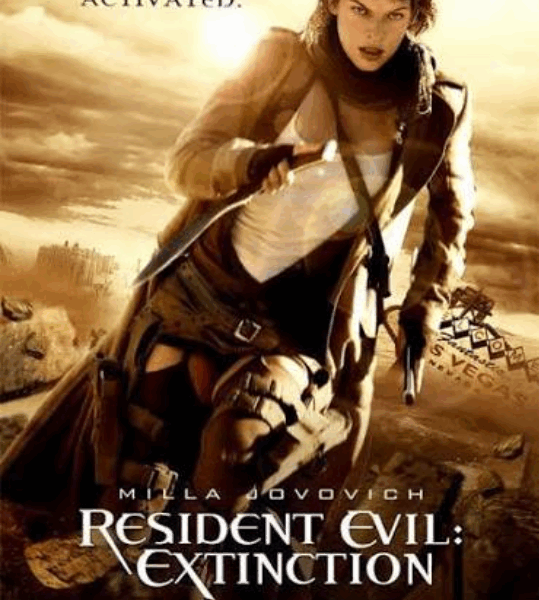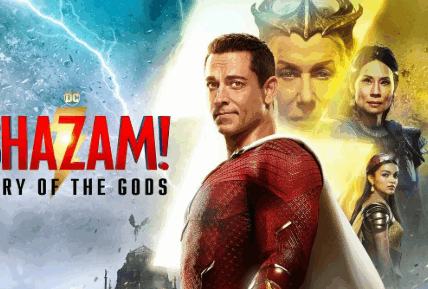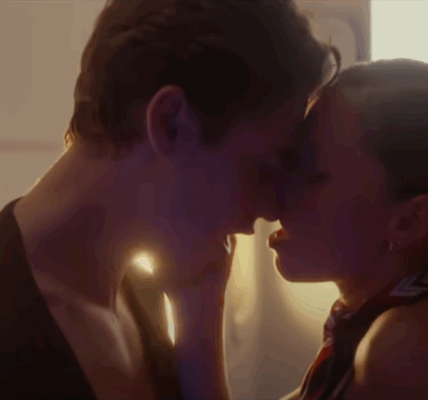1. Plot Summary
Resident Evil: Extinction is the third live-action film in the Resident Evil franchise.
The story takes place several years after the collapse of Raccoon City, with the T-Virus having spread globally. The world is now a barren wasteland overrun by zombies and ecological devastation.
Alice (Milla Jovovich), now enhanced through illegal experimentation, wanders in the desert, isolated and hunted by the Umbrella Corporation.
Meanwhile, a caravan of survivors led by Claire Redfield (Ali Larter) travels toward Alaska, following rumors of a safe haven.
Umbrella scientist Dr. Alexander Isaacs (Iain Glen) is experimenting with cloning and trying to harness Alice’s unique blood to develop a cure or weapon.
As the survivors’ paths converge, Alice confronts both her clones and Umbrella’s schemes, battles mutated zombies (including “super zombies”), and fights to determine whether she is unique—or just replicable.
The film ends with Alice defeating Dr. Isaacs, discovering more about the cloning project, and revealing that many clones of her exist—setting up further conflicts.
2. Notable Elements
Standout Scenes / Performances / Visuals
- The crow attack sequence: infected crows, feeding on the remains of zombies, become a surreal menace. Reviewers cite this as memorable (though criticized in execution) for its attempt to vary the zombie threat.
- The Las Vegas shoot-out / desert convoy set pieces: moving through desolate wastelands, ambush scenes, and environmental challenges reinforce the dystopian setting.
- The reveal of cloning / Alice’s clones: the idea that Alice’s body has been cloned, and that Umbrella is trying to replicate her capabilities, adds a layer of sci-fi intrigue beyond just zombie survival.
- Milla Jovovich’s presence: many critics note that she anchors the film, delivering a physical, committed performance that carries much of the film’s weight through action sequences.
Limitations / Critiques
- The plot is thin and derivative: many critics say the film offers more spectacle than substance, recycling familiar zombie / post-apocalypse tropes.
- Pacing and clarity issues: Some scenes feel muddled or overcut; action sequences sometimes sacrifice coherence for intensity.
- The crow scene is criticized: Hollywood Gothique called it one of the film’s low points, arguing the direction and logic falter.
- Visual effects inconsistencies: The film attempts ambitious effects (mutations, zombie hordes, cloning), but not all land convincingly.
3. Themes and Messages
- Survival & hope in collapse: The film dramatizes how humanity clings to sanctuary even when the world is overtaken by chaos.
- Identity, replication & uniqueness: Through cloning, the film probes what makes a person unique, and whether someone can be duplicated.
- Corporate ambition vs human costs: Umbrella’s continued experiments, even in a devastated world, underscore the tragedy of scientific hubris and the dehumanization of subjects.
- Sacrifice & loyalty: Characters must make hard choices to protect survivors, sometimes at personal cost.
- Mutation & evolution: The virus mutates, creating “super zombies.” The line between human and monster is blurred.
In terms of holiday or sentiment: Resident Evil: Extinction is not a film about celebration or familial warmth. But its themes of perseverance, protecting those we care for under dire conditions, and hoping even when the world is broken can resonate with emotional reflections often stirred during seasons of togetherness and memory.
4. Personal Impressions
What I liked:
- It leans fully into a post-apocalyptic vision rather than just incremental extension. The barren landscapes, environmental decay, and survivors’ desperation are well rendered.
- The cloning subplot gives the franchise renewed narrative ambition and connection to themes of identity and legacy.
- The action scenes, while occasionally chaotic, deliver enough energy to keep engagement.
- Milla Jovovich remains a magnetic presence—her physicality and intensity help maintain stakes during weaker moments.
What I found less effective:
- Sometimes I felt detached — character development is minimal, so emotional investment is harder.
- The crow sequence, while ambitious, feels tonally inconsistent and underdeveloped in logic.
- The effects and editing in some scenes are jarring, detracting from immersion.
- The narrative jumps (e.g. from desert to Vegas to labs) can feel disjointed, especially for viewers not steeped in the franchise lore.
5. Audience Recommendations
You’ll likely enjoy Resident Evil: Extinction if you:
- Are a fan of the Resident Evil films or the larger franchise, and follow its ongoing mythology.
- Like zombie / post-apocalyptic stories with strong action and occasional sci-fi ambition.
- Appreciate spectacle, pacing, and bold visuals, even if narrative nuance is sparse.
- Don’t mind plot holes or lore gaps, as long as you get a visceral ride.
You might be less pleased if you:
- Prefer films with deep character arcs, tight script logic, or fully coherent horror.
- Dislike visual effects or editing that sometimes feel rough or overcut.
- Want a horror film with minimal sci-fi or cloning elements—this film leans heavily into that.
6. Conclusion & Rating
Resident Evil: Extinction is far from flawless, but it is often entertaining. It shifts the franchise more toward dystopian action than pure horror and uses the cloning angle to re-energize old tropes. If you go in expecting style over depth and are okay with narrative gaps, it delivers moments of visual and action payoff.
Final Recommendation: Watch it if you’re a fan of the franchise or enjoy post-apocalyptic action horror. Don’t expect a masterclass in storytelling, but enjoy the ride.
⭐ Rating: 3 / 5
Watch more:




